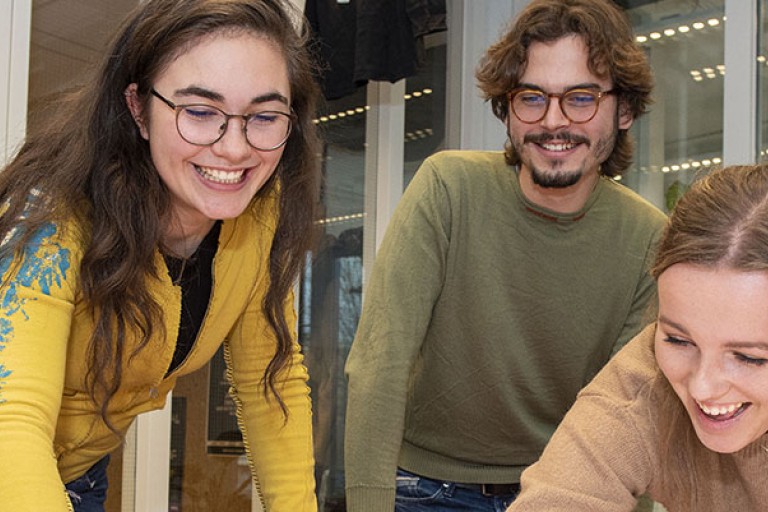
Performatory; Why not?
The corona crisis is no reason for the Performatory students to slow down. Together with student Anne van den Broek, Youp Selen explains why.
An interview, with Youp Selen and student Anne van den Broek of the learning community, or rather the learning family, of the Leisure & Events' social innovation track.
'Performatory is a contraction of Performance and Laboratory,' Youp explains. 'Students work on social innovation in a practical setting, that is the performance part, and in labs they develop knowledge together with experts and alumni. There are no classes in the programme; we are mostly busy with sharing knowledge and applying that knowledge in projects. Actually, we turn everything around. The students book the room they need for a brainstorm session and they also book the experts they expect to need. These experts could be lecturers, but also graduates or industry professionals.
'To support this learning concept, we use Microsoft Teams. The students develop this themselves. Everything can be found there, contract details, manuals, etc. We are used to working digitally so in that respect the impact of the corona crisis is negligible. Many activities can be changed to an online format. Students for instance organise talks about a topic of their interest. We no longer do this on campus but in live online events. We record it and turn it into a podcast.'
Is it not difficult to have a brainstorm session online? Without big sheets of paper and lots of coloured post-it notes?
'Brainstorming is not the essence of what we do,' Anne explains. 'Play is important and this can also be done online: playing with thoughts, exchanging ideas, in an open environment. It is not just about transmitting; you carefully have to listen to each other. In a video meeting this is sometimes tricky. You have to let each other finish and take turns speaking. In this setting a good agenda is paramount. We create this agenda, not the lecturer.'
'In the sessions we try to give meaning to knowledge,' Youp continues. 'Everyone has retrieved knowledge about the topic, from various sources. And then together we look at what it is really about. What it really means. Just like we did when we could still physically meet. But it can also be done online. It is exactly like what we are doing now in this conversation. You are well prepared and looked into what Performatory is and then I explain what it is we exactly do in these labs. This way we together add meaning to the information and only then it becomes useful.'
So Performatory is all set for an online future?
'Well no, not just online, I do miss the social dimension,' Anne responds. 'The morning coffee for instance, though we have started doing this online as well. Every morning we catch up for half an hour and discuss what needs to be done. You notice that many students want to contribute, especially now. Then we start our online brainstorming session. Together with Surplus Breda we have developed an idea to combat loneliness amongst the elderly. This obviously was already an issue before corona, so we do want to develop something which will be of use later on as well. This gave rise to the idea of a large colouring picture, where each elderly person colours a piece. Eventually it will become one joint picture with the message: Together against corona. The message can be changed after the corona crisis. Surplus has already indicated that it wants to expand this concept to nursing homes in the rest of The Netherlands.'
'Students work on this from three different labs,' Youp adds. 'One group looks at it from the process side, one group works on the experience dimension and the final group considers how this can contribute to the sense of community.'
Did any other of this kind of corona related initiatives spring up?
'I am working on a project in the Haagse Beemden neighbourhood in Breda,' Anne says. 'Together with the municipality, Surplus and other stakeholders we look at how we can motivate people to look out for and care more for each other. We call this project Care Free State. As opposed to the welfare state where many things are organised and provided by the government. Before the corona crisis we noticed that initiatives gained little traction, but it is different now. Now people see that initiatives like ours are necessary. People see the importance of rolling up their sleeves and doing things together, for each other.’
I always saw the value of our learning system but now it becomes even more valuable
Anne van den Broek, Leisure & Events student
'In that sense this crisis also brings us many good things,' Youp establishes. 'Our activities are now put in a very different perspective which makes our social innovation concept more accessible. This is good, because we need people, not just students, who have the courage to really start doing things differently.'
'I always saw the value of our learning system but now it becomes even more valuable,' Anne concludes. 'Because of this entire situation we encourage each other to learn new things. For instance an international student teaches Spanish online now. I myself teach Dutch to the internationals and others also join in, for instance a student's brother or friend. Why not!?’
Want to know more about Performatory?
Go to the website of Performatory